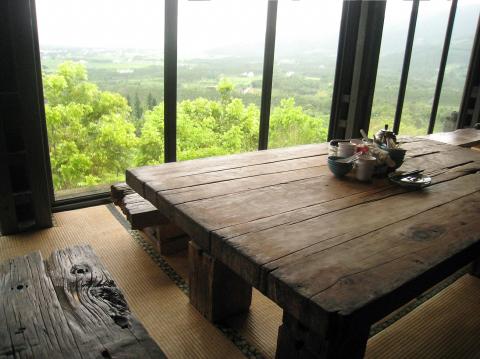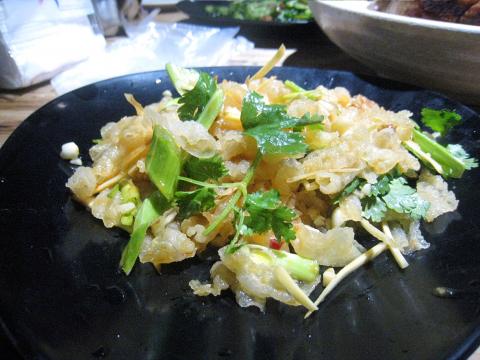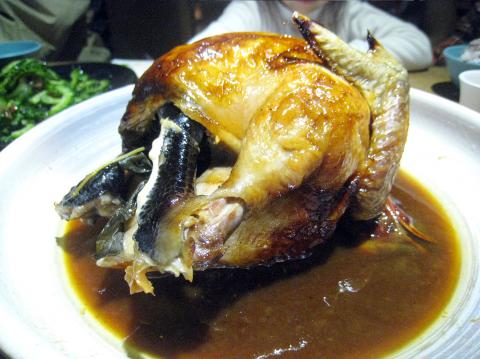Moon House is a rustic little complex perched up on the hillside over-looking the Huatung Rift Valley (花東縱谷) in Fenglin Township (鳳林鎮) in Hualien County. Over the years, it has acquired a reputation as a “must-visit” destination for visitors to Hualien, especially foodies, as its chicken in plum sauce (碳烤梅汁桶雞) has become something of a local classic. It was this very reputation as a tourist destination that had kept me away from Moon House, but after I did stop by for lunch, the restaurant immediately became a preferred choice for special meals.
True, there are usually too many people and the dining area can be noisy. Parking is horrendous, service is variable — ranging from quite good to quite annoyingly arrogant — and prices are a little on the high side. But the food is generally excellent, and when the weather is good, the atmosphere of its spacious courtyard and the views it affords over the valley are unparalleled.
The first impression of Moon House is that of a teahouse, designed specifically for visitors to relax and to take in the scenery in a mood of quiet contemplation. Stone seats, a comfortable balustrade against which to rest, a negligently casual arrangement around the fishpond and the occasional stray chicken wondering around all generate a mood of ease and relaxation. A small dining area directly overlooking the valley is generally booked out weeks in advance.

Photo: Ian Bartholomew, Taipei Times
Two larger dining areas branch off a central reception area. There is western-style seating as well as lower hawker stall type seating, all made of hardwood and placed on a floor of tatami matting. Remove the chairs and tables, and you could easily imagine coming to this place for a meditation retreat.
This ascetic first impression is quickly contradicted by the busy staff bringing plates of delicious-looking food to the table. The plating is not artful, but the signature dish — the chicken in plum sauce — is alluring with beads of succulent oil glistening against its slightly charred skin, and fruity and herbal aromas rising up from its plentiful gravy at the bottom of the serving bowl. This chicken comes with a pair of cotton workmen’s gloves and another pair of food service plastic gloves, both sets to be worn by the person deputed to tear this chicken apart and leave the dismembered carcass to steep momentarily in the sauce before digging in. The bird is priced according to provenance: A pure “local” chicken (土雞), often translated as free-range chicken, is NT$800, while a slightly less pure hybrid (仿土雞) is NT$550.
This chicken dish is best for a table of four or more, but such is its fame that I have seen tables of two manfully tackling it. Fortunately, Moon House has no objection to packing a doggy bag for leftovers.

Photo: Ian Bartholomew, Taipei Times
The chicken in plum sauce, while the establishment’s most famous dish, is far from being its only attraction. The food has a strong Hakka influence, and there are a number of specialties from this cuisine, including Hakka-style salted pork (客家鹹豬肉, NT$250 for a small serving) and Hakka stir fry (客家小炒, NT$220). The crunchy mountain pig skin (脆薄山豬皮, NT$200), served cold, is a good example of the labor-intensive preparation of unregarded ingredients to create something really delicious.
Even for dishes that are not part of Hakka cuisine, such as lion’s head meatballs (紅燒獅子頭, NT$380), the flavors are big and bold. In the case of these meat balls, those preferring the refined tastes of Jiangzhe cuisine might find Moon House’s version a little too rustic.
Moon House also does an outstanding selection of simple vegetable dishes, in many cases making clever use of local wild vegetables, adding an element of surprise to the flavor profile of well-known dishes. This is particularly pronounced with the soup of wild vegetables (野菜湯, NT$200), a mix of locally foraged vegetables often bitter in taste, but balanced well by a light stock and perfect for cutting through the heavy flavors of the meat dishes. Although the menu is not particularly large, it is well composed, with a good mix of the familiar and the unexpected. Even the most tediously predictable items, such as pineapple and shrimp (鳳梨蝦球, NT$200) are notable for the freshness of the ingredients and the willingness to let natural flavors shine through.

Photo: Ian Bartholomew, Taipei Times
Two set menus, perfectly suited to a table of eight to 12, are available for NT$3,500 to NT$4,000, which provide an excellent showcase of the establishment’s signature dishes.

Taiwan has next to no political engagement in Myanmar, either with the ruling military junta nor the dozens of armed groups who’ve in the last five years taken over around two-thirds of the nation’s territory in a sprawling, patchwork civil war. But early last month, the leader of one relatively minor Burmese revolutionary faction, General Nerdah Bomya, who is also an alleged war criminal, made a low key visit to Taipei, where he met with a member of President William Lai’s (賴清德) staff, a retired Taiwanese military official and several academics. “I feel like Taiwan is a good example of

March 2 to March 8 Gunfire rang out along the shore of the frontline island of Lieyu (烈嶼) on a foggy afternoon on March 7, 1987. By the time it was over, about 20 unarmed Vietnamese refugees — men, women, elderly and children — were dead. They were hastily buried, followed by decades of silence. Months later, opposition politicians and journalists tried to uncover what had happened, but conflicting accounts only deepened the confusion. One version suggested that government troops had mistakenly killed their own operatives attempting to return home from Vietnam. The military maintained that the

Before the last section of the round-the-island railway was electrified, one old blue train still chugged back and forth between Pingtung County’s Fangliao (枋寮) and Taitung (台東) stations once a day. It was so slow, was so hot (it had no air conditioning) and covered such a short distance, that the low fare still failed to attract many riders. This relic of the past was finally retired when the South Link Line was fully electrified on Dec. 23, 2020. A wave of nostalgia surrounded the termination of the Ordinary Train service, as these train carriages had been in use for decades

Lori Sepich smoked for years and sometimes skipped taking her blood pressure medicine. But she never thought she’d have a heart attack. The possibility “just wasn’t registering with me,” said the 64-year-old from Memphis, Tennessee, who suffered two of them 13 years apart. She’s far from alone. More than 60 million women in the US live with cardiovascular disease, which includes heart disease as well as stroke, heart failure and atrial fibrillation. And despite the myth that heart attacks mostly strike men, women are vulnerable too. Overall in the US, 1 in 5 women dies of cardiovascular disease each year, 37,000 of them